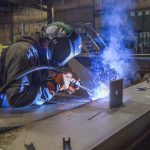For a good number of years, the building and industrial sectors have relied heavily on welding as a vital method. On the other hand, as a result of developments in technology, welding has grown more productive and accurate, particularly as a result of the introduction of stud welding machines. The welding business has been completely transformed by these equipment, which make it simpler and more efficient to combine separate pieces of metal. The procedure of using an electric arc to fuse a stud to a base metal is known as arc stud welding, and it is the method that is used by stud welding equipment. Due to the fact that holes do not need to be drilled and welding rods are not used in this procedure, the whole process is much more efficient than conventional welding techniques.
Stud Welding Procedure
A flux tip and a ferrule, which is a ceramic ring, are used in the process of stud welding. These components work together to concentrate the heat, prevent oxidation, and keep the molten metal in the weld zone. After the weld has been finished, the ferrule is removed from the fastener by breaking it off. In contrast to other methods of attaching, stud welding does not leave any marring on the surface of the component that is facing away from the fastener. Here, the two most significant points are as follows:
- Studs created through drawn-arc welding
When it comes to distorted bars, the lengths range anywhere from 3/8″ to 60″. During the welding process, arc studs often have an aluminum flux ball put onto the weld end of the stud. This ball provides assistance to the welding process. The two most popular types of steel used in the production of drawn arc weld studs are mild steel and stainless steel.There are numerous reputable stud welding machine manufacturers that provide top-notch equipment to meet the diverse needs of businesses.
- Welding with a short cycle and studs
It is possible to employ capacitor discharge weld studs rather than drawn arc studs while engaging in short cycle stud welding, which is a more efficient kind of drew arc stud welding. Although it does not produce welds that are as strong or as penetrative as those produced by the drawn-arc approach, this technology is more tolerant of welding studs to thinner sheet metals than that method. In addition to this, the use of ceramic ferrules is not essential in any way. The operators of this operation will sometimes utilize shrouding gas in order to cut down on spatter.
Stud Welding Applications
The construction industry, automobile industry, shipbuilding industry, and manufacturing industry are just some of the fields that have found widespread use for stud welding equipment. When time is of the essence or when projects demand a big quantity of welds, they are very helpful. They are also useful in projects that require huge amounts of welds. Because of their speed and precision, stud welding machines have become an essential component in a variety of different welding processes.
In addition, the welds produced by stud welding machines have an excellent strength and endurance compared to other types of welds. Because of this, they are excellent choices for uses in which the integrity of the structure is essential, such as in the construction of frames, bridges, and large pieces of machinery.
It is possible to generate welds on both sides of the base material at the same time while using stud welding, which is one of the method’s primary benefits. Because of this, further post-welding procedures, like as grinding or polishing, are not required, which results in a significant savings in both time and resources. Additionally, stud welding provides a superior weld quality, which guarantees constant and uniform connections throughout the whole of the project.
Some Benefits Of Stud Welding Are
- The welded joint has a tensile strength that is much higher than that of either the parent material or the stud.
- Thankfully, stud welding forms a strong bond between the parent material and the fastener in a short amount of time.
- It is not always a cost-effective solution to join two separate items together by welding, particularly for tasks that are time-consuming or comprised of pricey components. On the other hand, stud welding results in lower overall maintenance expenses.
- Because a ceramic shield covers both the arc and the weld zone while stud welding is being done, there is no such thing as weld spatter.



